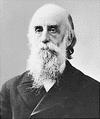- Abbott, Lyman
-
born Dec. 18, 1835, Roxbury, Mass., U.S.died Oct. 22, 1922, New York, N.Y.U.S. minister.Son of the writer Jacob Abbott (1803–79), he left law practice to study theology and was ordained in 1860. He became editor of the Illustrated Christian Weekly in 1870 and editor in chief of Henry Ward Beecher's Christian Union in 1881. In 1888 he succeeded to Beecher's pulpit in Brooklyn. A leading exponent of the Social Gospel movement, he sought to apply Christianity to social and industrial problems, rejecting both socialism and laissez-faire economics. On other problems Abbott presented the viewpoint of liberal evangelical Protestantism.
 Lyman Abbott, 1901Library of Congress, Washington, D.C.
Lyman Abbott, 1901Library of Congress, Washington, D.C.* * *
▪ American ministerborn December 18, 1835, Roxbury, Massachusetts, United Statesdied October 22, 1922, New York, New YorkAmerican Congregationalist (Congregationalism) minister and a leading exponent of the Social Gospel movement.Abbott left law practice to study theology and was ordained in 1860. After serving in two pastorates, he became associate editor of Harper's Magazine and in 1870 editor of the Illustrated Christian Weekly. In 1876 he joined Henry Ward Beecher (Beecher, Henry Ward)'s Christian Union, a nondenominational religious weekly, and in 1881 Abbott became its editor in chief. He succeeded in 1888 to Beecher's pulpit in the Plymouth Congregational Church, Brooklyn, where he served until 1899.Abbott became interested in the social problems associated with the Industrial Revolution of the late 19th century. Under his editorship the Christian Union (renamed Outlook in 1893) promulgated the Social Gospel, which sought to apply Christianity to social and industrial problems. His Christianity and Social Problems (1897), The Rights of Man (1901), The Spirit of Democracy (1910), and America in the Making (1911) present his moderate sociological views, which rejected both socialism and laissez-faire capitalism. On other problems, Abbott presented the viewpoint of liberal Evangelical Protestantism. He sought to interpret, rather than condemn, the effect of the theory of evolution on religion.* * *
Universalium. 2010.
